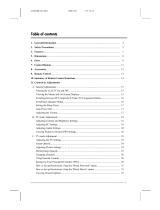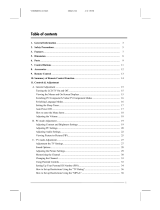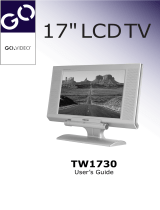Page is loading ...

Table of contents
1. General Information ....................................................................................3
2. Safety Precautions .......................................................................................5
3. Features ......................................................................................................7
4. Dimensions .................................................................................................8
5. Ports ...........................................................................................................9
6. Control Buttons .........................................................................................11
7. Accessories ...............................................................................................12
8. Remote Control .........................................................................................13
9. Summary of Remote Control Functions .................................................................14
10. Controls & Adjustment
A. General
Adjustment ............................................................................................15
Turning the LCD TV On and Off ................................................................15
Viewing the Menus and On-Screen Displays .................................................15
Switching PC/Composite/S-Video/TV/Component Modes ...........................16
Switching Language Modes ........................................................................16
Setting the Sleep Timer ..............................................................................17
Auto Power Off ......................................................................................17
How to enter Menu Items .......................................................................18
Adjusting the Volume ..................................................................................18
B. PC mode Adjustment ..............................................................................19
Adjusting Contrast and Brightness Settings .................................................19
Adjusting Picture Settings ......................................................................20
Adjusting Image Settings .......................................................................21
Adjusting Audio Settings .......................................................................23
Viewing Picture-in-Picture (PIP) ..................................................................26
C. TV mode Adjustment ...............................................................................28
Adjusting the TV Settings ........................................................................28
Sound Options .........................................................................................29
Adjusting the Picture Settings ..................................................................30
Memorizing Channels ..............................................................................31
Changing Channels ..................................................................................35
Using Parental Controls .........................................................................35
Setting Up Your Personal ID Number (PIN) ...............................................36
How to Set up Restrictions Using the "TV Rating" ......................................38
How to Set up Restrictions Using the "MPAA" .........................................40
1

Viewing Closed Captions ........................................................................42
D. Other functions ..........................................................................................43
11. Troubleshooting .......................................................................................45
12. Specifications ..........................................................................................49
2

General Information
This 27” and 30” wide active matrix TFT (thin film transistor) liquid crystal
display is designed for use as a stand alone TV as well as a display device for
video electronics appliances and personal computers.
Warning: To reduce the risk of fire or electric shock, do not expose this product to
rain or moisture.
Caution: To reduce the risk of electric shock, do not attempt to disassemble or
modify this device. There are no user-serviceable parts inside. Refer
any service issues to qualified service personnel.
Caution: FCC/CSA regulations state that any unauthorized changes or modifications to
this equipment may void the user's authority to operate it.
Important: One Federal Court has held that unauthorized recording of copyrighted
TV programs is an infringement of U.S. copyright laws. Certain Canadian programs
may also be copyrighted and any unauthorized recording in whole or in part may be in
violation of these rights.
CAUTION
Important Information
Risk of electric
shock. Do not open.
3

WARNING:
Do not leave stationary images, patterns, PIP windows, or letterbox images on the
screen for prolonged periods of time as this may result in permanent damage to the
LCD panel. This type of damage is not covered under warranty. The following are
examples of, but not limited to, potentially hazardous display output: side bar images,
video game patterns, closed captioning, channel logos and letterbox black bars. To
p
revent this type of damage, it is recommended to display constantly moving images
that fill the screen as often as possible.
According to industrial standards for LCD display technology; there are a certain number o
f
allowable defective pixels. Although we produce panels with more than 99.9% active
cells, there still may be some cells that do not produce light or remain constantly lit. For
further information, please contact sales or technical support.
Thank You for Choosing This Product
Your new LCD TV was built utilizing the latest advancements in television technology.
We are proud to offer you a product that will provide convenient, dependable service and
enjoyment for years to come.
4

Safety Precautions
1. Cleaning: Unplug the power cord from the AC outlet before cleaning the product.
Use a damp cloth to clean the product. Do not use liquid cleaners or aerosol
cleaners.
2. Water and moisture: Do not use the product near water or areas of high moisture
content such as swimming pools, bathtubs or wet basements.
3. Heat sources: Keep the product away from heat sources such as radiators,
heaters, stoves and other heat-generating products (including amplifiers).
4. For added protection during a lightning storm or for extended periods of non-
use, unplug the power cord from the wall outlet and disconnect the antenna (if
used). This will prevent damage to the product due to power line surges.
5. If an outside antenna is connected to the product, make sure the antenna is
properly grounded so as to provide some protection against voltage surges.
Example of antenna grounding
As per national electrical code
Antenna lead in wire
Antenna discharge
unit
Grounding conductors
Ground clamps
Power service
grounding
Electrode system
5

6. Stand: Do not place the product on an unstable
cart, stand, tripod or table. Placing the product
on an unstable base can cause the product to fall,
resulting in serious personal injuries as well as
damage to the product. Use only a cart, stand,
tripod, bracket or table recommended by the
manufacturer or sold with the product. Only use
mounting hardware recommended by the
manufacturer.
7. Use care when moving the product on a rolling cart. Sudden stops, excessive
force and uneven floor surfaces can cause the product to fall from the cart.
8. Ventilation: The vents and other openings in the cabinet are designed for ventilation.
Do not cover or block these vents and openings as insufficient ventilation can cause
overheating and/or shorten the life of the product. Do not place the product on a bed,
sofa, rug or other similar surfaces since they can block ventilation openings. This
product was not designed to operate in an enclosed environment. Don't place the
product in an enclosed space such as a bookcase or rack, unless proper ventilation is
provided or the manufacturer's instructions are followed.
9. The LCD panel used in this product is made of glass. Therefore, it can break if
the product is dropped or struck.
10. During the LCD panel lifespan it is normal for a few pixels to become defective.
Non-active pixels may appear on the screen as fixed points of red, blue or green.
Refer pixel policy questions to the reseller for further clarfication on acceptable loss.
11. An outside antenna system should not be located in the vicinity of overhead power
lines or other electrical conduits. When installing an outside antenna, use extreme
caution to prevent the antenna from coming into contact with said items as contact
with them may be fatal.
6

List of Features
Your TV is designed with the latest technology and is a high-performance display
device that includes the following features:
• Multiple input sources including antenna terminal, D-sub (15pin VGA),
composite, S-Video and component ports.
• Easy-to-use remote control and on-screen-display (OSD) menu system.
• PIP (picture in picture) mode for displaying multiple sources at the same time
on the same screen.
• Built-in 10W dual channel speakers plus a headphone out jack for
private listening.
• Fine tuning control for the sharpest picture possible. (OTA TV viewing
only)
• Built-in multi-channel sound decoder for stereo and bilingual broadcasts.
• Automatic channel program for up to 125 channels.
• Automatic sleep timer controls from 30 to 90 minutes in 30 minute
increments.
• Automatic power off feature after 10 minutes without a signal.
• Adjustable picture and sound settings that are stored in the TV's
memory.
• Component video input for high definition TV programming (HDTV
ready), resolution up to 720P, 1080i.
• 5 preset stereo equalizer modes; 1 mode for end user settings.
• Automatic Picture Control (APC) and Aspect Ratio Control (ARC) functions
for end user customization of viewing preferences.
• Built-in 3D comb filter and 3D de-interlacing for best possible picture quality.
Features
7

Dimensions
Unit: mm
8

Ports
Video Input device
DVD player
Satellite receiver
Set top box
VIDEO Input device
Digital Camera
Satellite receiver
Set top box

10

Control Buttons
These buttons control your TV’s basic features, including the on-screen menu. To use
advanced features you must use the remote control.
POWER: turn the LCD TV on or off.
SOURCE: set up the input source ( PC, AV, SV, TV, CV ).
MENU: display the main menu.
CHANNEL (down or up): change the channel.
VOLUME (+/-): increase or decrease the volume.
ASPECT RATIO: set up the display output mode (Normal, Periscope, Zoom or Full).
Remote sensor
Aim the remote control towards this region of the TV for optimal reception.
11

Accessories

Remote Control
13

Power Control
POWER button Turn the TV on or off
Selecting the primary signal source
TV button Switch to TV mode.
AV button Switch to AV (composite) mode.
SV button Switch to S-Video mode.
CV button Switch to CV (component) mode (Y/Pb/Cb,
Y/Pr/Cr).
PC button Switch to the PC mode.
Menu Settings
MENU/ENTER button Display the on-screen menu or enter a sub-
menu
TITLE/EXIT button Display the current channel; Display the
current primary signal source; Exit a menu or
sub-menu
Changing Channels
UP button Press Up to change the channel
DOWN button Press Down to change the hannel.
0~9 ; +100 button To manually select channels.
RETURN button Return to previously viewed channel.
Sound Control
VOL+ button Increase volume level.
VOL- button Decrease volume level.
MUTE button Temporarily turn off audio.
MTS button Cycle through stereo, mono or separate audio
program (SAP) multi-channel sound services.
AUDIO button Toggle audio source between main display
and PIP.
TREBLE button Adjust treble levels.
BASS button Adjust bass levels.
SUBWOOFER button Enable/Disable the subwoofer.
PIP Control
ON/OFF button Enable/Disable PIP viewing window. Press
again to make the sub display disappear.
TV AV SV CV button SIZE button Select PIP input source. PIP must be enabled.
Toggle PIP window size.
POSITION button Move the PIP window to Top Left, Top Right,
Bottom Right, Bottom Left, Repeat
Other Functions
SWAP button Make the PIP display the main display and vice
versa.
RESET button Return to the original factory settings.
ARC button (Aspect Ratio Control) In PC mode, set the picture mode to full
screen or normal screen. In Video mode,
toggle the picture mode between normal, full,
periscope, zoom
APC button (Automatic Picture Control) Toggle screen luminosity between Normal,
Clear, Dark and Theater modes.
SLEEP button Select a preset time for automatic power
down.
V-CHIP button Enter the parental control menu.
C.C button Enable/Disabled closed captioning.
ADD button Add a channel to the memorized channel list.
ERASE button Delete a channel from the memorized channel
list.

Controls & Adjustment
A. General Adjustment
Turning the LCD TV On and Off
Plug the power cable into the socket located on the right rear of the LCD TV.
Press the
POWER button on the Remote Control or use the Power button located within
the control buttons panel found on top of the TV.
An indicator light shows as follows:
Power On
(
TV
,
Video mode
)
---
N
o li
g
ht
Power off --- Red light
PC mode --- Green light
Power Saving (PC mode) --- Amber light
Note: The TV will automatically power off if no signal is detected for 10 minutes.
Viewing the Menus and On-Screen Displays
Viewing the Menus
1. With the power on, press the
MENU Button.
The main menu appears on the screen.
2. Press the
VOL (+) or VOL (-) button to scroll
through menu options. Then press the
ENTER
button to access sub-menu items. Press the
EXIT button to exit from any Menu.
NTSC
H 31.2 kHz V 50.2 Hz
15

Switching PC/Composite/S-Video/TV/Component Modes
1. Turn on the power.
2. Select an input source as described below:
TV button to switch to TV mode.
PC button to switch to PC mode (VGA).
AV button to switch to Composite mode.
SV button to switch to S-Video mode.
CV button to switch to Component mode (Y, Pb/Cb,
Pr/Cr).
Switching Language Modes
1. Press the MENU button to display the main menu.
2. Press the
ENTER button to enter Management.
Press the
UP or DOWN button to select the
Language sub-menu, then press the
ENTER button.
3. Press the
UP or DOWN button to select the
desired language mode then press the
ENTER
button to confirm the language selection.
4. Press the EXIT button to exit from the OSD
NTSC
H 31.2 kHz V 50.2 Hz
16
Power

Setting the Sleep Timer
You can set the Sleep Timer to automatically turn
off the LCD TV.
1. Press the
SLEEP button to display the Sleep
Timer screen.
2. Toggle the
SLEEP button to set the sleep timer
(i n 30 minute i n t e rv a l s ) .
30 min | 60 min | 90 min | OFF
Note:
The Sleep Timer screen automatically disappears in 3
seconds.
Auto Power Off
The TV will automatically power off if no signal is detected for 10 minutes.
17

How to enter Menu Items
1. Press the
MENU button to display the main
menu screen.
2. Press the
VOL (+) or VOL (-) button to toggle
through the menu options. Then press the
ENTER
button to access sub-menu items.
3. Press the
VOL (+) or VOL (-) button to make
adjustments.
4. Press the
EXIT button to return to the previous
screen or exit from the Menu.
Adjusting the Volume
Using Volume Control
Press the
VOL (+) or VOL (-) button to increase or
decrease the volume level.
Using Mute
At any time, you can temporarily turn off the
sound using the Mute button.
1. Press the
MUTE button and the sound turns off.
2. Press the
MUTE button or VOL (+) or VOL (-)
buttons to turn the sound back to the previous
level.
( AV ) ( Off )
( No )
NTSC
H 31.2 kHz V 50.2 Hz
18

Each viewing mode supports separate adjustments for brightness and contrast levels.
PC mode is best viewed with lower brightness and contrast levels as compared to
other modes.
Adjusting the Contrast & Brightness Settings
1. Press the MENU button to display the main menu.
(
No
)
NTSC
H 31.2 kHz V 50.2 Hz
2. Press the
VOL (+) or VOL (-) button to move the
cursor to the Picture Adjust menu.
3. Press the ENTER button to access the sub-menu.
Use the up or down arrows to select an item.
4. Press the
VOL (+) or VOL (-) button to set the
level of the desired item.
+
Contrast
+
+
19

5. Press the EXIT button to return to the previous
screen or exit.
Adjusting Picture Settings
1. Press the
MENU button to display the main menu.
( PC ) ( Off )
( No )
2. Press the
VOL (+) or VOL (-) button to move the
cursor to the Picture Adjust menu.
Cool Neut. Warm User
3. Press the ENTER
b
utton to access the sub-menu.
4. Press the
UP or DOWN button to select Color temp.
5. Press the
VOL (+) or VOL (-) button to set the
desired temperature (Cool, Neut. , Warm, User ).
20
/



